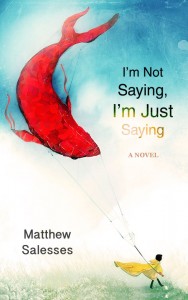I’m Not Saying, I’m Just Saying
 I’m Not Saying, I’m Just Saying
I’m Not Saying, I’m Just Saying
by Matthew Salesses
Civil Coping Mechanisms, February 2013
138 pages / $13.95 Buy from Amazon
Koi fish have hundreds of scales that form a protective armor around them. Matthew Salesses’s I’m Not Saying, I’m Just Saying is a collection of 115 flash fictions that, like those scales, explore the spoken and unspoken nuances that connect and glue relationships in all their misfit forms. Many of the characters go unnamed, a decision that suggests that the companions symbolize divergent desires. There’s the wifely woman who’s his main lover and there’s a “white woman” who acts as a mistress as well as another Korean woman who is in place “for emergencies.” Each serve a different need, though none can satisfy him because he partitions himself like the segmented chapters that comprise the book. They are lyrical segments akin to jazz solos forming a striking concerto of prose. The impetus that triggers the journey of the book is the appearance of a son he never knew he had. When the boy’s mother, an old lover, passes away, the narrator takes the son into his home. Rather than a definitive reaction to this revelation, there’s a miasma of conflicted emotion, an uncertainty that could best be summed up in the piece, “She Was a Tsunami to His Earthquake:”
His lovers, his co-workers, and finally, his son, form a tenuous thread that bind the invisible wavelengths of his life together. Only, he is always trying to split them apart and keep them isolated in a delicately stratified web. In describing the side girl-on-the-side, he says: “I had to be careful with her, though I wasn’t technically married, because she collected the crumbs of truth, but for an hour with her, I was someone else, and when I left, I could discard that part of me and know it would be repossessed.” The elegance of the book lies in the poetic congruence with which his life is shattered by circumstantial incongruence. Say, for example, his observation at an art gallery with his son that only the letter T separates the word “paint” from “pain.” This was an association formed from his failure to be the artist he aspired to be as a freshman in college. He is protecting himself from pain, but entering it willingly to try to teach his son something about painting. That contradiction of both being in the mural and trying to control it hints at the theme of a man all too aware of his foibles and flaws, but still is helpless to do anything about it. Twisted accents in his relationships add shades and make every interaction a layered strip tease, tantalizingly bare without showing anything essential:
May 17th, 2013 / 11:00 am
GIVEAWAY: I’m Not Saying, I’m Just Saying

Last weekend, I invited Matthew Salesses to show up and rock out at this reading series in DC. The room was poorly lit, and the readers had to stand on a rickety wooden stage. The venue made the whole thing feel like we were at some sort of half-assed comedy show, but Matt and the other readers (Laura van den Berg, Dan Gutstein, and Sarah Burnett) were utterly incredible—especially considering that there was this obnoxious improv group stomping on the floor above us because they thought they were at basketball practice, or something.
Anyway, there’s nothing all that funny about Matthew’s new Book, I’m Not Saying, I’m Just Saying. At its surface, Matthew’s book is about the predicted failures and slow learning curve of a nameless new father. But deeper down, it explores how our actions and desires are intrinsically linked to our identities and our understanding of ourselves. I’m personally a big fan of Matthew’s terse, controlled prose, which almost always looks this beautiful:
I’m Not Saying is a short book with short chapters, but it’s worth reading slowly. I’m always inspired by how dutifully Matthew matches tone and subject matter in his writing, and there’s more than enough proof out there that I’m not the only one inspired by it.
But I’ll stop gushing and get to what’s important: Matthew has agreed to give away two signed copies of I’m Not Saying, I’m Just Saying. Quote the weirdest/funniest/strangest thing your father has ever said (and try to avoid being offensive) in the comments by Tuesday, March 5th and Matthew will pick two winners. Get’it’gurl.
The Good Men Fiction Project

The Good Men Project Magazine launched Weekend Fiction on January 1, 2011. Every Saturday, this section will feature original short fiction that speaks to the male experience, from award-winning, along with new and emerging, authors.
The debut features a new short story, “Yosemite,” from James Franco. Also featured in the debut is “Saint Roger of Fox Chase,” by Sean Ennis of Gotham Writer’s Workshop.
Weekend Fiction will be edited by Good Men Project Magazine contributor Matthew Salesses, author of Our Island of Epidemics. Future issues will include stories by accomplished authors George Singleton, Ben Greenman, Kim Chinquee, Viet Thanh Nguyen, Alexander Chee, Ryan Call, and others.
Submissions are welcome. They are looking for fiction in the range of 1200-10,000 words in some way touching on the “male experience.” Go here for guidelines and to submit.

